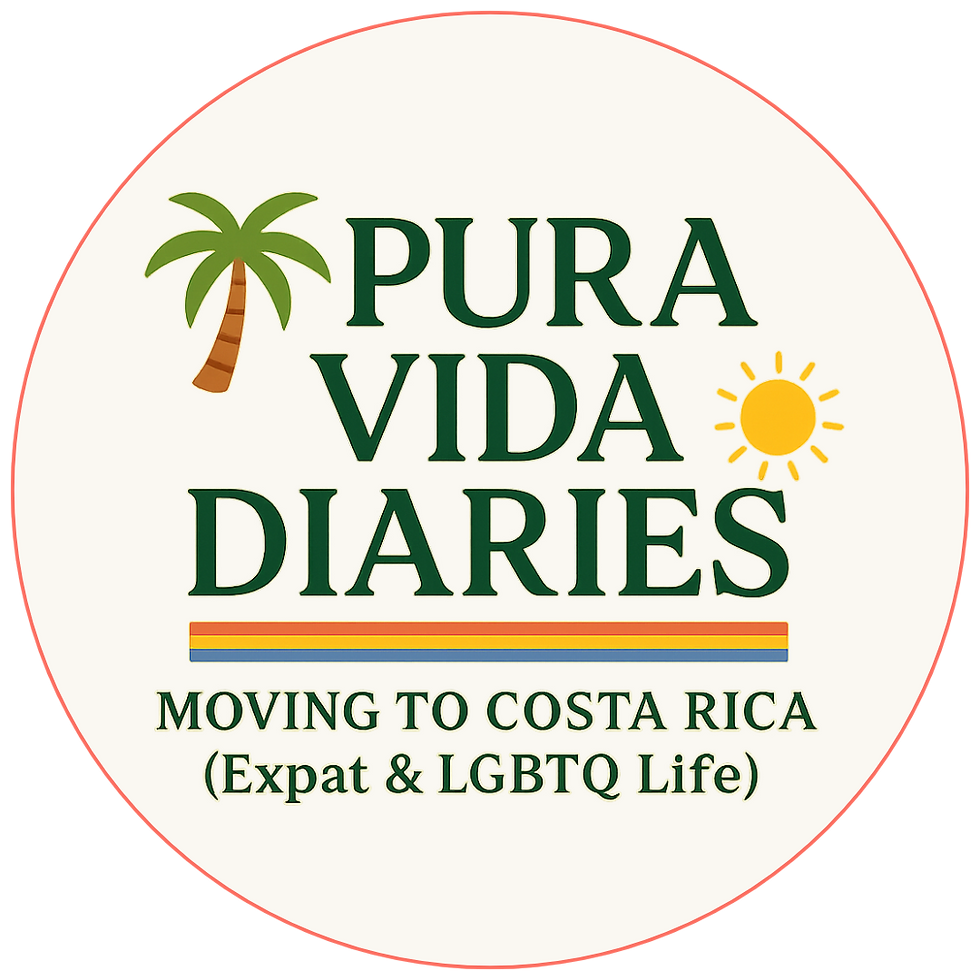Remote Work in Costa Rica: Jungle Wi-Fi, Time Zones, and the Digital Nomad Life
- Waymon Hudson

- Oct 29, 2025
- 5 min read
Updated: Nov 6, 2025

Working remotely from Costa Rica sounds like the dream — until your Zoom freezes mid-presentation and your boss gets a full HD close-up of your “why won’t this connect” face.
Don’t panic. You can work from paradise — toucans, ocean views, and all — if you know how to do it right. And I’m here to tell you what’s real, what’s myth, and how not to be that expat crying over a Wi-Fi router.
1. The Time Zone Perk (and the Daylight Savings Curveball)

Costa Rica runs on Central Standard Time (UTC -6) year-round — no daylight savings. That means:
Perfect overlap for remote workers with U.S. Central and Eastern teams.
Twice a year, you’ll have a few confused meetings when your coworkers “spring forward” or “fall back.”
💡 Pro tip: Let them adjust — your new schedule revolves around the surf report, not their daylight savings drama.
2. Internet Speeds: Yes, We Have Fiber

Gone are the days of “jungle Wi-Fi” horror stories (mostly). Costa Rica has solid infrastructure — especially in cities and mid-sized towns. Heck- I live in the literal jungle and have fiber internet. Monthly cost: $40–$80.
Fiber Internet: 100–500 Mbps (and faster in some areas)
Monthly cost: $40–$80 USD
Best providers: Kolbi, Liberty, Tigo
💡 Real talk: Choose your home based on Wi-Fi first, ocean view second. Because that 8 a.m. stand-up call won’t care how nice your hammock looks.
3. Backups, Backups, Backups
This is where smart digital nomads separate from the “I just wing it” crowd.

Starlink: Satellite system that works nearly anywhere, with 100+ Mbps speeds.
Local SIM + Hotspot: Get prepaid data from Kolbi, Claro, or Liberty.
Coworking Spaces: Tamarindo, Santa Teresa, Nosara, Uvita, and San José all have thriving hubs with backup generators, AC, and good coffee.
🌴 Pro tip: Have a backup for your backup. Power outages are common, especially in rainy season — I once led a meeting powered entirely by my phone hotspot and prayer.
That means get a rechargable battery backup (avaiable at most stores, ususally arond $50-$100 depending on the strength). Most can power your internet router and laptop for 4-6 hours on battery back up alone.

4. Myth: You’ll Work From the Beach Every Day
Reality check: sand, humidity, and laptops don’t mix.
Still, a shady café by the ocean or a terrace overlooking the jungle? That’s the real Costa Rica setup. Save the beach for your after-work unwind or a cheeky “look at my office view” Instagram post. (Yes, we see you.)
5. The Joy of Work-Life Balance (Pura Vida Edition)

The real reason remote work thrives here isn’t the Wi-Fi — it’s the lifestyle. Costa Rica practically forces you to unplug.
When work ends, you can: 🌅 Watch the sunset from the beach 🌿 Hike to a waterfall 🎤 Sing karaoke with your neighbors 🐶 Take your dog for a jungle walk
Work-life balance isn’t a buzzword here. It’s culture. And honestly? Once you get a taste of that “Pura Vida” rhythm, you’ll wonder how you ever lived without it.

6. Taxes, Visas, and the Digital Nomad Program
If you’re planning to stay long-term, Costa Rica’s Digital Nomad Visa is a game-changer.
Here’s what you need:
Income: $3,000/month (individual) or $4,000/month (family)
Valid health insurance
Remote work for a foreign company (not local employment)
Benefits:
Legal residency for up to 2 years (renewable)
Tax exemptions on foreign income
Import your laptop and gear tax-free
💡 Pro tip: Apply online through the Costa Rican immigration site — and hire a local immigration attorney.
Learn more residency pathways in my Costa Rica Residency Explained blog.

7. Real Talk: What I’ve Learned
When I first moved here, I thought my Wi-Fi anxiety would be my downfall. Turns out, the jungle has better bandwidth than some big cities.
But the real shift wasn’t technical — it was mental. I stopped living to work and started working to live.
Costa Rica will do that to you.

Quick Takeaway:
You can run your business or job from Costa Rica — you just need:
✅ Reliable internet (and backups)
✅ A flexible schedule
✅ A little patience when the power blinks
✅ A good sense of humor
Because if your “office” has monkeys outside the window and sunsets on demand, a few Wi-Fi hiccups feel like a small price to pay.
Also check out the rest of the Pura Vida Diaries Blog Series:
Part 1: Moving to Costa Rica: Why I Chose Here Out of Anywhere in the World
Part 2: Thinking of Moving to Costa Rica? Cost of Living, Rent & Reality Check
Part 3: Residency in Costa Rica: How to Stay Legally (Without the Border-Run Headache)
Part 4: How to Be a Good Immigrant in Costa Rica (a.k.a. Don’t Be “That” Expat)
Part 6: Pets in Paradise: Bringing Your Dog or Cat to Costa Rica — and Why You Might Adopt One Here
Part 7: Culture Shock in Costa Rica: Why It’s the Best Thing That Ever Happened to Me (Pura Vida, Baby)
Part 9: Learning Spanish in Costa Rica: A Fun (and Honest) Guide for Expats Who Aren’t 22 Anymore
Part 10: Remote Work in Costa Rica: Jungle Wi-Fi, Time Zones, and the Digital Nomad Life
Part 11: Costa Rica Expat Challenges: The Hard Stuff No One Posts on Instagram
Basically? If you’ve ever Googled “Can I really move to Costa Rica?” …this series is your sign.
FAQ: Remote Work in Costa Rica
Is remote work possible in Costa Rica?
Yes! With widespread fiber internet, coworking spaces, and strong mobile coverage, Costa Rica is a top destination for digital nomads and remote professionals.
Does Costa Rica have good internet?
Absolutely. Most cities and towns offer high-speed fiber with speeds up to 500 Mbps. Remote regions can use Starlink or mobile hotspots for backup.
Can I work remotely from Costa Rica legally?
Yes — the Digital Nomad Visa allows foreign remote workers to live and work in Costa Rica for up to 2 years while enjoying tax exemptions.
What are the best places for remote work in Costa Rica?
Tamarindo, Nosara, Santa Teresa, Uvita, Atenas, and Escazú are popular for reliable internet, coworking spaces, and strong expat communities.
Is the time zone good for U.S. jobs?
Yes! Costa Rica’s Central Standard Time overlaps perfectly with most U.S. work schedules, with no daylight savings adjustments locally.



All information seems solid. Just a few possible kinks. I am not that familiar with digital nomad visa processing time, temporary residency can take up to 2 years. Also depending on the time or day and with whom you talk with temporary residency you cannot get Kolbi internet or post paid telephone. You need to be a permanent resident or naturalized. Helps to have a good Tico friend who can apply for you. As a simple option Liberty provides really good service. Yes the WiFi services have improved greatly in the past few years, however electric grid is another story. The idea of backup power for internet is as great idea . I taught online for several years outsid…